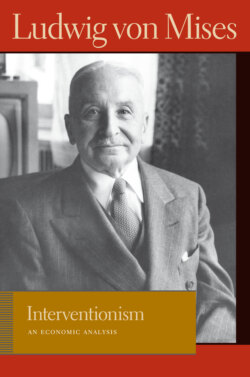Читать книгу Interventionism - Людвиг фон Мизес - Страница 13
На сайте Литреса книга снята с продажи.
4. The Capitalist State and the Socialist State
ОглавлениеIn a market economy the state concerns itself with the protection of the life, health, and private property of its citizens against force or fraud. The state insures the smooth working of the market economy by the weight of its coercive power. It refrains, however, from any interference with the freedom of action of the people engaged in production and distribution so long as such actions do not involve the use of force or fraud against the life, health, safety, or property of others. This very fact characterizes such a community as a market economy or a capitalist economy.
If liberals,3 i.e., classical liberals, oppose governmental interference in the economic sphere they do so because they feel certain that the market economy is the only efficient and workable system of social cooperation. They are convinced that no other system would be in a position to bring more welfare and happiness to the people. The English and French liberals and the fathers of the U.S. Constitution insisted upon the protection of private property, not to further the selfish interests of one class, but rather for the protection of the whole people and because they saw the welfare of the nation and of each individual most secure in the system of a market economy.
It is, therefore, naive to say that the true liberal advocates of private property are enemies of the state because they want to see the realm of governmental activity limited. They are not enemies of the state but opponents of both socialism and interventionism because they believe in the superior efficacy of the market economy. They want a strong and well-administered state because they assign to it an important task: the protection of the system of a market economy.
Even more naive were the Prussian metaphysicians when they maintained that the program of the adherents of a market economy was negative. To these supporters of Prussian totalitarianism everything seemed negative that stood in the way of their desire to create more governmental jobs. The program of the advocates of a market economy is negative only in the sense in which every program is negative: It excludes all other programs. Because the true liberals are positively for private ownership of the means of production and for a market economy they are necessarily against socialism and interventionism.
Under socialism all economic matters are the responsibility of the state. The government gives orders in all lines of production just as in the army or in the navy. There is no sphere of private activity; everything is directed by the government. The individual is like the inmate of an orphanage or of a penitentiary. He has to do the work which he is ordered to do and he can consume only what has been allotted to him by the government. He can read only those books and papers printed by the government printing office and he can travel only if the government grants him the means for doing so. He has to assume the occupation which the government has chosen for him and he has to change his occupation and his domicile when the government commands. In this sense, we may say that the citizens of a socialist community are not free.4
